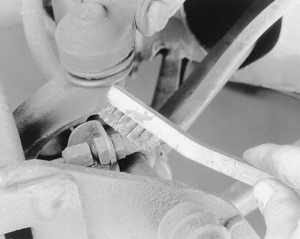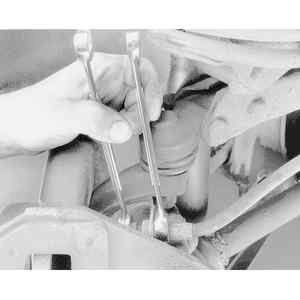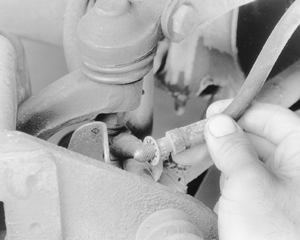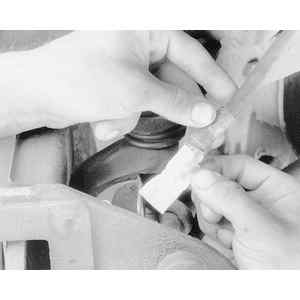To Remove:
- Disconnect the negative battery cable.
- Park the vehicle on a level surface. Place the vehicle
in PARK (automatic) or REVERSE (manual) with the engine OFF, and apply
the parking brake. Chock the rear wheels to prevent vehicle movement.
- Raise and safely support the vehicle.
- Remove any wheel and tire assemblies necessary for
access to the particular line you are removing.
-
Thoroughly clean the surrounding area at the joints to be disconnected.
| Use a brush to clean the fittings of any debris

|
- Place a suitable drain pan under the connection to
be disconnected.
-
Using two line wrenches (one to hold the connection and one to turn
the fitting), disconnect the hose or line to be replaced.
| Use two wrenches to loosen the fitting. If available,
use flare nut type wrenches

|
- Disconnect the other end of the line or hose, moving
the drain pan if necessary. Always use a line wrench to avoid damaging
the fitting.
- Disconnect any retaining clips or brackets holding
the line and remove the line from the vehicle.
NOTE: If the brake system is to remain
open for more time than it takes to swap lines, tape or plug each remaining
clip and port to keep contaminants out, and fluid in.
| Any gaskets/crush washers should be replaced with new
ones during installation

|
| Tape or plug the line to prevent contamination

|
To Install:
NOTE: Install the new line or hose,
starting with the end farthest from the master cylinder. Connect the other
end, and then confirm that both fittings are correctly threaded and turn
smoothly using finger pressure. Make sure the new line will not rub against
any other part. Brake lines must be at least 1/2 in. (13mm) from the steering
column and other moving parts. Any protective shielding or insulators
must be reinstalled in the original location.
WARNING
Make sure the hose is NOT kinked or touching any part of the frame or suspension
after installation. These conditions may cause the hose to fail prematurely.
- Using two line wrenches as before, tighten each fitting.
- Install any retaining clips or brackets on the lines.
- If removed, install the wheel and tire assemblies,
then carefully lower the vehicle to the ground.
- Install the wheel and tire assembly.
- Refill the brake master cylinder reservoir with clean,
fresh brake fluid, meeting the DOT specification recommended by the manufacturer.
Properly bleed the brake system.

